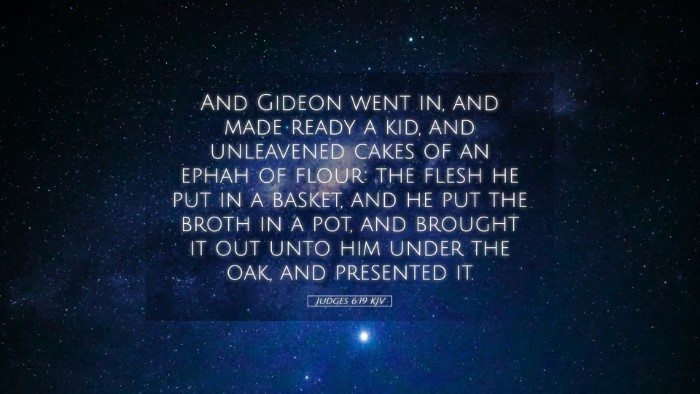Commentary on Judges 6:19
Judges 6:19 states, "And Gideon went in, and made ready a kid, and unleavened cakes of an ephah of flour: the flesh he put in a basket, and he put the broth in a pot, and brought it out unto him under the oak, and presented it." This passage captures a pivotal moment in Gideon's calling and highlights various theological and practical themes notable to pastors, scholars, and students.
Contextual Overview
The book of Judges recounts a time when Israel experienced cycles of sin, oppression, repentance, and deliverance. Gideon emerges as one of the judges during Israel's distress under Midianite oppression. His calling (Judges 6:11-24) showcases God's direct intervention and preparation for delivering Israel.
Insights from Matthew Henry
Matthew Henry emphasizes the spiritual significance of Gideon's offering:
- Symbolism of the Offering: Henry notes that Gideon’s choice to present a kid and unleavened cakes symbolizes his recognition of God's holiness. The unleavened bread often signifies purity, paralleling the need for holiness in the service of God.
- Act of Faith: The act of preparation implies a step of faith. Gideon, despite his initial doubts about his stature (Judges 6:15), proceeds with obedience.
- Divine Reception: Henry underscores God's acceptance of Gideon's offering, establishing a paradigm that God desires not merely ritualistic acts but sincere worship directed towards Him.
Insights from Albert Barnes
Albert Barnes provides a more practical lens through which to view Gideon’s actions:
- Cultural Relevance: Barnes explains that the preparation of a kid (a young goat) and unleavened bread aligns with ancient Near Eastern hospitality practices, suggesting that Gideon was responding to God's divine visitor with appropriate respect and reverence.
- Intentional Preparation: The meticulous preparation of both the meat and the bread illustrates the importance of offering our best to God—a principle that should resonate in contemporary worship practices.
- God's Methodology: Barnes points out that God often tests the fidelity of His servants through tasks that might seem trivial, contending that engagement in even small acts of obedience can have colossal significance.
Insights from Adam Clarke
Adam Clarke offers a detailed analysis of the text, enriching the commentary with historical context:
- Historical Context: Clarke highlights that Gideon prepared an ephah of flour, indicating a substantial offering, relevant in a time of scarcity due to Midianite oppression, which signifies both trust in God’s provision and a generous heart.
- Symbolizing Sacrifice: Clarke draws parallels between Gideon’s offerings and the sacrificial system outlined in the Law, emphasizing the need for devotion and sacrifice in one’s relationship with God.
- Response to Divine Encounter: Clarke also reflects on Gideon’s obedience as a response to his divine encounter, depicting a model for Christians to actively seek communion with God through outreach and service.
Theological Significance
The theological themes inherent in Judges 6:19 extend beyond Gideon’s time and culture:
- Worship and Service: The passage commands attention to the nature of worship; it must balance reverence towards God with acts of service and offerings of our lives.
- Faith in Action: It also illustrates that faith propels action—true belief manifests in tangible deeds, an essential tenet for pastors and teachers.
- God’s Sovereignty and Human Response: The relationship between divine sovereignty and human agency is underscored as God initiates a transformative calling while ensuring the response of the called, highlighting the ongoing partnership between the divine and humanity.
Practical Application
For today’s church leaders and scholars, this passage invites several key applications:
- Encouragement in Preparation: Leaders are encouraged to be intentional and prepared in their service to God. Gideon’s preparations serve as a practical model for congregations seeking to worship with mindfulness and diligence.
- Faithfulness Amidst Doubt: Gideon’s initial hesitance resonates with many believers today; yet his eventual obedience serves as an encouragement for others to step out in faith despite their uncertainties.
- Modeling Generosity: The act of offering presents a framework for understanding generosity in the modern church. Congregations are urged to think about what they bring to God and to give with open hearts, even during difficult times.
Conclusion
Judges 6:19 is not merely a historical narrative; it presents a rich tapestry of theological truths and practical applications. The insights drawn from public domain commentaries by Matthew Henry, Albert Barnes, and Adam Clarke converge to illustrate the importance of Gideon's faith-filled obedience and the significance of worship expressed through preparation and offering. As both an encouragement and a challenge, this verse calls current and future church leaders to cultivate a heart of service and honor in their relationship with God, heartening them to recognize the weight of their actions, which can have lasting implications for the communities they serve.


